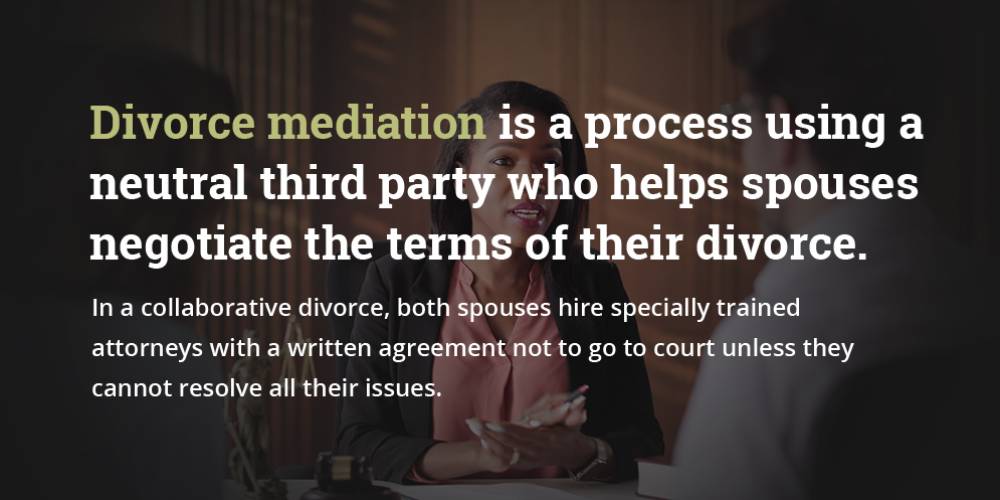630-462-9500
After Hour New Client Telephone Number 630-690-6077
1776 S. Naperville Road, Building B, Suite 202,
Wheaton, IL 60189
Understanding the Differences Between Mediation and Collaborative Law
 Collaborative law and mediation are two alternative dispute resolution methods that allow couples to resolve divorce issues outside of the courtroom. Although they share common goals, such as reducing conflict, saving time and cost, and maintaining privacy, they differ significantly in approach, structure, and the level of legal involvement. As of July 2025, Illinois courts continue to support both processes, especially because many judges favor out-of-court settlement efforts whenever feasible.
Collaborative law and mediation are two alternative dispute resolution methods that allow couples to resolve divorce issues outside of the courtroom. Although they share common goals, such as reducing conflict, saving time and cost, and maintaining privacy, they differ significantly in approach, structure, and the level of legal involvement. As of July 2025, Illinois courts continue to support both processes, especially because many judges favor out-of-court settlement efforts whenever feasible.
If you are considering divorce and want to understand which process might suit your circumstances best, it is important to speak with a seasoned Wheaton, IL divorce attorney who can explain the pros and cons of each option based on your specific family, needs, financial situation, and goals.
What is Mediation in the Context of Illinois Divorce?
Divorce mediation is a structured, voluntary process in which a neutral third party helps spouses communicate and negotiate the terms of their divorce. The mediator does not represent either spouse and cannot provide legal advice. Their role is to guide dialogue, identify sticking points, clarify misunderstandings, and keep the process focused on resolution.
Because mediation relies on voluntary cooperation, it typically works best when both spouses are willing to engage in honest communication and work toward compromise. Mediation is also confidential, so any statements made during the sessions cannot be used as evidence in court if mediation fails.
In many DuPage County divorces, mediation is required at some stage in the process, particularly when parents cannot initially agree on parenting time or parental responsibilities. However, parties can also choose to mediate financial issues, such as property division, spousal maintenance, and child support, with or without attorneys present.
What is Collaborative Law in the Context of Divorce?
Collaborative divorce is a formal legal process in which both spouses hire collaboratively trained attorneys and agree, in writing, not to go to court. The goal is to resolve all aspects of the divorce through a series of four-way meetings and joint discussions that focus on problem-solving rather than legal threats or positional bargaining.
Unlike mediation, collaborative law guarantees that each spouse has legal representation throughout the process. The parties also sign a participation agreement stating that if negotiations break down, neither attorney can represent the client in litigation. This requirement reinforces the commitment to settlement and ensures that all participants have a shared incentive to reach a resolution.
Collaborative teams often include professionals beyond the attorneys, such as neutral financial advisors, child specialists, or mental health professionals acting as divorce coaches. These experts bring clarity to complicated issues and help keep emotional conflict in check.
Key Differences Between Mediation and Collaborative Law
Although both processes occur outside the courtroom and aim to promote amicable divorce, their structures differ in several important ways. In mediation, control rests primarily with the spouses. The mediator acts as a facilitator, helping each party express concerns and reach a compromise, but without advocating for one side or the other. Some spouses choose to mediate with attorneys present in the room; others consult attorneys separately between sessions. Either way, legal advice is not part of the mediation itself.
In contrast, collaborative divorce ensures legal advocacy throughout the process. Each spouse has their own attorney, who provides guidance, reviews options, and helps develop proposals tailored to their client’s priorities. The collaborative model is ideal for divorces involving complex finances, sensitive parenting issues, or situations where one party feels vulnerable negotiating alone.
The cost of each method also varies. Mediation is often the less expensive route because fewer professionals are involved, and the process may conclude in just a few sessions. Collaborative divorce, while more expensive, provides a higher level of structure, support, and customized problem-solving, especially when financial advisors or child specialists are involved.
Timeframe is another consideration. Mediation can move quickly if both spouses are cooperative and the issues are straightforward. Collaborative divorce may take longer due to the need to coordinate multiple schedules and address emotional dynamics more comprehensively. However, it often avoids the delays and public exposure of courtroom litigation.

When Might Mediation Be the Right Choice for a Divorcing Couple?
Mediation can be a good fit when both parties are committed to resolving their divorce fairly and are on relatively equal footing in terms of emotional readiness and access to financial information. It is also useful for couples with limited financial resources who want to avoid the higher cost of hiring separate attorneys or experts.
That said, mediation may be less effective when there is a significant imbalance in power, knowledge, or assertiveness. In such cases, one spouse may dominate the discussion, and the other may agree to terms that are not in their best interest simply to avoid conflict. Without legal advice during the sessions, some individuals may unknowingly compromise their rights.
When Might Collaborative Law Be the Right Choice for a Divorcing Couple?
Collaborative law offers a more supportive environment, especially when communication is difficult but litigation would be too destructive. It is especially useful for parents who want to preserve a cooperative co-parenting relationship, or for spouses with substantial marital assets, business interests, or pensions that require specialized financial input.
Couples who choose the collaborative process often report higher satisfaction with the outcome, not because they "won" but because they felt heard, respected, and involved in crafting an agreement that reflected their unique circumstances. Importantly, collaborative divorce can also accommodate religious, cultural, or personal values that might not be well addressed in a traditional courtroom setting.
The Danger of Signing a Divorce Settlement Without an Attorney
Regardless of the process you choose, it is critical not to finalize any divorce agreement without first reviewing it with a qualified divorce attorney. In mediation, particularly, some spouses believe that once an agreement is written down, it is binding. That is not necessarily true, nor should it be if the terms are unfair or fail to account for your legal rights.
Even if the mediator provides a template or draft, you should not sign a marital settlement agreement, parenting plan, or judgment for dissolution without independent legal review. Mistakes in these documents can cost you time with your children, your retirement savings, or your financial stability. Once entered, court orders are difficult to undo.
Contact a DuPage County, IL Collaborative and Mediation-Focused Divorce Attorney
Alternative dispute resolution is not right for everyone, but for many couples it offers a more respectful, flexible, and cost-effective path to divorce. Whether you are leaning toward mediation or considering the collaborative process, our team can help you evaluate your options and protect your rights throughout. To schedule a private consultation and speak with a Wheaton, IL divorce attorney at The Stogsdill Law Firm, P.C., call 630-462-9500 today.




















